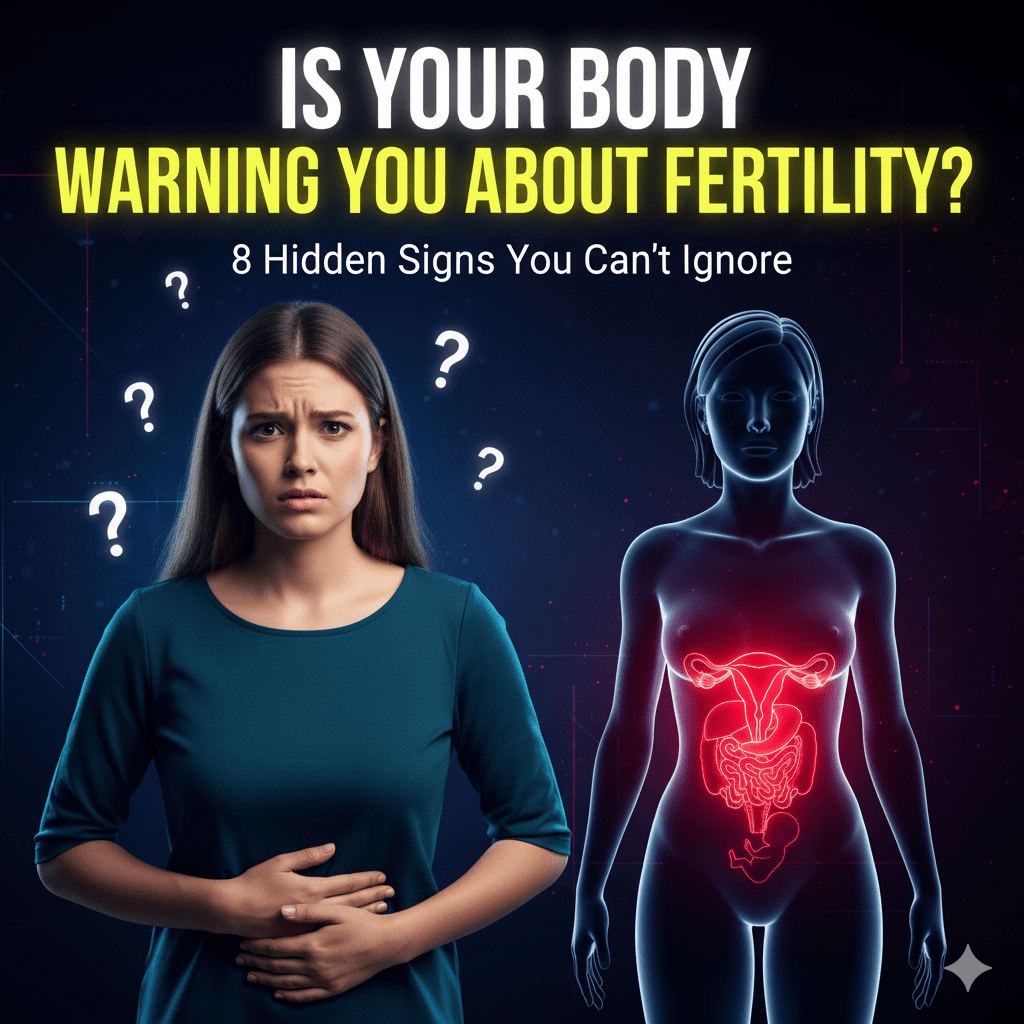
Woman Fertility
Fertility is a topic most people don’t think about until they actively start trying to conceive. But the body often sends subtle clues about reproductive health long before that moment. These signals may go unnoticed in daily life, yet paying attention to them can provide valuable insights into your fertility. Whether you’re planning to have children soon or simply want to better understand your reproductive health, knowing the early signs your body gives can help you take charge of your wellness. Here are eight signs to watch for that may reveal more about your fertility than you realize.
1. Irregular or Absent Menstrual Cycles
One of the most important indicators of fertility health is your menstrual cycle. Regular cycles typically 21 to 35 days, suggest that your body is ovulating consistently. Irregular or missed periods can point to conditions such as polycystic ovary syndrome (PCOS), thyroid disorders, or hormonal imbalances, all of which may affect fertility. If your cycles are unpredictable, it doesn’t always mean infertility, but it’s worth consulting a healthcare professional for further evaluation.
2. Severe Period Pain or Heavy Bleeding
Menstrual cramps are common, but extreme pain or abnormally heavy bleeding might signal underlying issues like endometriosis, fibroids, or pelvic inflammatory disease. These conditions can interfere with ovulation or implantation. If you need strong painkillers each month or notice clots larger than a quarter, it’s important to seek medical advice. Early diagnosis and treatment can preserve fertility and prevent complications.
3. Changes in Cervical Mucus
Cervical mucus plays a critical role in conception, as it helps sperm reach the egg. Around ovulation, mucus typically becomes clear, stretchy, and slippery similar to egg whites. If you don’t notice these changes during your cycle, it may mean ovulation is not occurring regularly. On the other hand, infections or hormonal imbalances can also alter cervical mucus. Monitoring these changes can give you valuable clues about your fertile window and overall reproductive health.
4. Unexpected Weight Fluctuations
Sudden or unexplained weight gain or loss can disrupt your hormones and menstrual cycles. For example, being underweight may stop ovulation altogether, while being overweight can contribute to insulin resistance and conditions like PCOS. Both extremes can make conception more difficult. Maintaining a healthy weight through balanced nutrition and physical activity supports hormone regulation, egg quality, and overall fertility health.
5. Low Sex Drive or Hormonal Shifts
A noticeable decline in libido, mood swings, or fatigue may point to hormonal imbalances, particularly involving estrogen, progesterone, or testosterone. These hormones not only affect reproductive function but also influence energy levels and emotional well-being. While stress, lifestyle, and medications can contribute to low libido, persistent changes should be evaluated by a healthcare provider. Restoring hormonal balance often improves fertility outcomes.
6. Skin and Hair Changes
Your skin and hair can reflect your reproductive health. Persistent acne, excessive facial or body hair (hirsutism), or thinning scalp hair may indicate PCOS or elevated androgen levels. Both conditions can affect ovulation and fertility. In men, thinning hair or decreased facial hair growth may point to low testosterone levels, which can impact sperm production. These outward signs are your body’s way of signaling that something might need closer attention.
7. Digestive and Metabolic Symptoms
Bloating, constipation, or sudden changes in digestion can sometimes be linked to reproductive disorders. For instance, endometriosis often causes both painful periods and digestive discomfort. Similarly, insulin resistance associated with PCOS can trigger cravings, fatigue, and metabolic issues. Although digestive problems can stem from many causes, when they occur alongside irregular cycles or hormonal symptoms, it may be time to investigate your fertility more closely.
8. Age and Family History Factors
Age is one of the strongest predictors of fertility. For women, fertility begins to decline in the early 30s and drops more sharply after 35. Men also experience changes in sperm quality as they age, though typically later. Family history matters too if your mother or sisters experienced early menopause or fertility challenges, your risks may be higher. Awareness of these factors allows you to take proactive steps, like consulting a specialist earlier or considering fertility preservation options.
When to See a Specialist
Noticing one or more of these signs doesn’t always mean you’ll struggle to conceive, but it does indicate your body may need support. If you’ve been trying to get pregnant for over a year (or six months if you’re over 35) without success, it’s wise to see a fertility specialist. Modern diagnostics such as hormone testing, semen analysis, and ultrasound imaging can identify potential issues quickly. With the right guidance, many couples overcome fertility challenges through lifestyle changes, medical treatments, or assisted reproductive technologies like IVF.
Schedule a Semen Analysis at Dr. Essa Lab
Supporting Your Fertility Health
Even if you’re not ready to start a family, protecting your fertility today is an investment in your future. Here are some actionable tips:
- Maintain a balanced diet rich in whole foods, vitamins, and antioxidants.
- Exercise moderately too little or too much physical activity can affect hormone balance.
- Manage stress through mindfulness, yoga, or relaxation techniques.
- Limit alcohol, smoking, and caffeine, as they negatively impact reproductive health.
- Schedule regular checkups to monitor your reproductive wellness and address concerns early.
Final Thoughts
Your body often communicates its fertility status through physical, hormonal, and emotional signs. By tuning in to these signals, whether it’s irregular cycles, skin changes, or unexpected weight fluctuations, you can gain a clearer understanding of your reproductive health. Remember, noticing these signs isn’t about causing alarm but about empowering yourself with knowledge. Fertility is a deeply personal journey, and paying attention to your body is the first step toward making informed, proactive decisions for your future.



